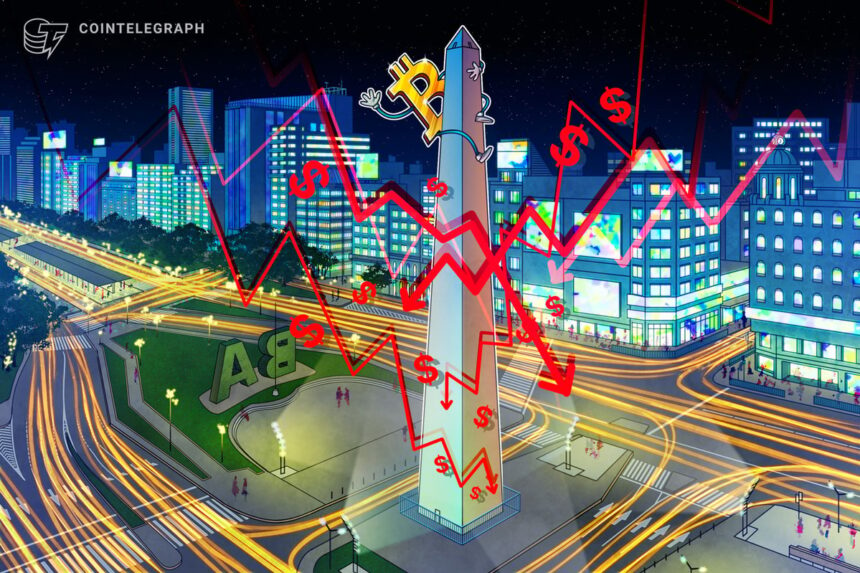As Argentina continues to face an economic crisis characterized by soaring inflation and a depreciation of its currency, President Javier Milei is navigating a turbulent political landscape amid increased skepticism from investors and financial experts. The peso has plummeted approximately 4.5% in the past week, intensifying doubts about Milei’s capacity to implement the necessary fiscal and structural reforms, particularly following disappointing electoral outcomes in the Buenos Aires province earlier this month. The political situation has been further complicated by a corruption probe involving a family member of Milei, deepening the prevailing uncertainty.
The adverse investor sentiment resulted in significant capital outflows from the Argentine market, compelling the central bank to intervene by expending around $1.1 billion over three days to prop up the peso. This intervention was particularly burdensome given that the country only maintains about $20 billion in liquid foreign reserves, according to Bloomberg’s analysis. Additionally, Argentina’s dollar bonds experienced a sharp decline amid concerns that Milei’s administration was depleting its financial resources at an unsustainable rate.
In response to Argentina’s escalating financial strain, U.S. Treasury Secretary Scott Bessent recently described the nation as “a systemically important ally” in Latin America, announcing that the U.S. is considering a range of stabilization measures. These could include establishing swap lines, making direct currency purchases, and utilizing the Treasury’s Exchange Stabilization Fund to acquire Argentine government debt. Bessent’s comments momentarily bolstered investor confidence, resulting in a reported surge of over 9% in Argentina’s Merval stock index in U.S. dollar terms, although it remains nearly 49% down for the year.
Despite this brief recovery in investor sentiment, controversy continues to follow Milei. His ties to the cryptocurrency market, particularly his backing of the LIBRA project — often criticized as a pump-and-dump scheme — have drawn federal scrutiny, although he subsequently disbanded the task force investigating the matter.
Economist Saifedean Ammous, known for his book The Bitcoin Standard, has been vocal about Milei’s handling of the economy, criticizing the administration for exacerbating fiscal challenges through what he describes as a “debt and inflation Ponzi.” Ammous highlighted the government’s failure to effectively combat inflation, citing that the Treasury could only sell its latest bond offering after significantly raising interest rates to an astonishing 88%. He accused the government of continuing to inflate the money supply despite Milei’s libertarian principles.
While inflation rates have decreased since Milei’s inauguration in December 2023, they remain firmly in the double digits, stoking fears about the ongoing economic trajectory. The peso’s recent decline further underscores the challenging economic climate that Argentines are experiencing.
As citizens grapple with these uncertainties, many are turning to alternative currencies. The ongoing volatility of the peso — which is managed within a fluctuating band against the dollar — has led to increased interest in more stable assets, particularly US dollar-backed stablecoins. Ignacio Gimenez, a business manager at Lemon, a crypto trading platform, reported a surge in stablecoin purchases, noting that September 14 marked the app’s highest daily volume of stablecoin transactions since 2024. This trend highlights a shift in consumer behavior as many Argentines opt for stablecoins over traditional pesos in light of the rising dollar.
Gimenez observed that the election period saw a pronounced preference for stablecoins, with users often selling stablecoins for pesos. He explained that the ongoing fiscal adjustments by Milei’s government make it difficult to assess the long-term impact on cryptocurrency adoption but confirmed that stablecoins are increasingly used as a hedge against economic instability.
In addition to stablecoins, Bitcoin has captured the attention of many Argentines seeking a store of value. Since the onset of relative exchange rate stability and dampening inflation in 2024, Bitcoin has grown attractive to some investors, with reports suggesting that there are now more Argentines holding Bitcoin than those acquiring crypto dollars via the Lemon platform. This trend underscores how digital assets are emerging as viable alternatives for local investors amid a precarious economic environment.
In summary, as Argentina navigates a complex interplay of economic challenges and political turmoil, residents are increasingly looking beyond traditional monetary systems in search of stability. The rise in cryptocurrency adoption reflects both a response to immediate economic pressures and a longer-term shift towards decentralized financial solutions.







